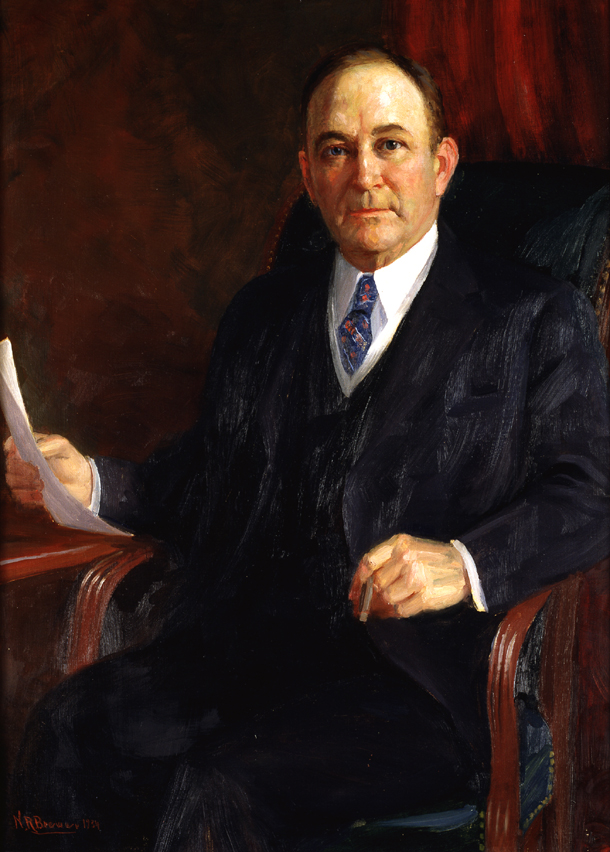- Joseph Taylor Robinson
Infobox Officeholder
name = Joseph Taylor Robinson
imagesize = 150px
order3 = 4thUnited States Senate Majority Leader
term_start3 =March 4 ,1933
term_end3 =July 14 ,1937
predecessor3 =James Eli Watson
successor3 =Alben W. Barkley
jr/sr2 = United States Senator
state2 =Arkansas
term_start2 =March 4 ,1913
term_end2 =July 14 ,1937
predecessor2 =William M. Kavanaugh
successor2 =John E. Miller
order = 23rdGovernor of Arkansas
term_start =January 16 ,1913
term_end =March 8 ,1913
predecessor =George Washington Donaghey
successor =William Kavanaugh Oldham t| birth_date =August 26 ,1872
birth_place =Lonoke, Arkansas
death_date = death date and age|1937|7|14|1872|8|26
death_place =Washington, D.C.
party = Democratic
spouse =
profession =
religion =Joseph Taylor Robinson (
August 26 ,1872 -July 14 ,1937 ) was an American politician fromArkansas , of the Democratic Party. He was a state representative, a U.S. Representative, Governor of Arkansas, U.S. Senator, andSenate Majority Leader , and he was a candidate for Vice President in the 1928 U.S. presidential election.Born in
Lonoke, Arkansas , Robinson attended theUniversity of Arkansas and studied law at theUniversity of Virginia .In 1894 Robinson was elected to the Arkansas Legislature and served one term. Robinson was elected to the
United States House of Representatives in 1902 from the Sixth District of Arkansas, and was re-elected to four subsequent terms, serving until 1913.In 1912 he was elected Governor of Arkansas. He resigned his Congressional seat on
14 January 1913 and took office as governor on15 January . In the meantime, however, Senator Jefferson Davis died on3 January . Davis had been re-elected to a new term beginning3 March 1913. That term was now open. On27 January , only 12 days after Robinson took office as governor, the legislature elected him to the U.S. Senate for that term.Robinson was the last Senator elected by a state legislature rather than by direct popular vote. The
Seventeenth Amendment to the United States Constitution , requiring direct election, was ratified and took effect on8 April 1913. Other Senators elected to terms starting in 1913 were elected earlier (Arkansas had to have a second election after Davis' death). SenatorJames H. Brady ofIdaho was elected to fill a vacancy on24 January ; he was next to last.Robinson resigned as governor on
10 March . Though he served as governor for only 55 days, his administration focused on providing funds to complete the new state capitol building, creating a labor statistics board, adopting an official state flag, and working to create a highway commission.From the outset, Robinson impressed other senators with carefully crafted speeches. He mastered the Senate's complex rules and practices, possessed tenacious loyalty to friends and party, a passion for detail and a killer's instinct in debate. Wedded to his job, he arrived early each day, stayed late, and studied legislation at home. [Bacon, 64.]
He staunchly supported the policies of
Woodrow Wilson even as other Democrats faltered. He championed the Keating-Owen Child Labor Act and worked to enact bills to regulate railroads and other key industries. He led the Senate to arm merchant ships and voted to declare war on Germany. [Bacon, 69.]Robinson was re-elected to the Senate in 1918, 1924, 1930, and 1936. He was elected
Senate Minority Leader for the 68th Congress (1923-1925), and remained leader of Senate Democrats till his death, becomingSenate Majority Leader in 1933 when the Democrats became the majority. He was the first Democrat to serve as formally designated Majority Leader. Some senators resented his autocratic style. In debate he could be terrifying. He would grow red in the face, pound his desk, gesture wildly, and stomp his feet. [Bacon, 64.]Richard L. Riedel, a Senate press gallery attendant in the 1920s and 1930s recalled, "When [Robinson] would go into one of his rages, it took little imagination to see fire and smoke rolling out of his mouth like some fierce dragon. Even when he kidded me, he spoke in loud gasps while puffing his cigar. Robinson could make senators and everyone in his presence quake by the burning fire of his eyes, the baring of his teeth as he ground out the words, and the clenching of his mighty fists as he beat on the desk before him." [Riedel, 142.]
The press referred to him as "scrappy Joe," and he nearly came to blows with
Robert La Follette ,Porter McCumber ,Thomas Heflin , andHuey Long . His response to a guard who questioned his credentials at the 1920 Democratic National Convention was apunch in the face. Despite this temper, he maintained strong friendships across party lines. [Bacon, 65, 68.]Robinson was a leading spokesman for President
Franklin D. Roosevelt 'sNew Deal legislation and hiscourt-packing plan in 1937. Robinson's death effectively killed off the Roosevelt proposal to restructure the United States Supreme Court.Robinson was the Democratic candidate for Vice President in 1928, as the running mate of
Alfred E. Smith ("see:U.S. presidential election, 1928 )".Senator Robinson died in
Washington, D.C. . He is buried at the Roselawn Cemetery inLittle Rock, Arkansas . His home in Little Rock, theJoseph Taylor Robinson House , was declared a National Historic Landmark in 1994.Robinson is the namesake of Camp Joseph T. Robinson, Arkansas's primary National Guard base; Robinson Center in downtown Little Rock; and elementary, middle and high schools on the northwestern edge of Little Rock. Robinson's face appears on the front of the United States half dollar produced for the 1936 Arkansas Centennial; he was one of only four men to appear on a U.S. coin while living.
Electoral history
References
Donald C. Bacon, "Joseph Taylor Robinson: The Good Soldier," in "First Among Equals: Outstanding Senate Leaders of the Twentieth Century," Richard A. Baker & Roger H. Davidson, eds., Washington: Congressional Quarterly, 1991: 63-97.
Richard L. Riedel, "Halls of the Mighty: My 47 Years at the Senate," Washington and New York: Robert B. Luce, 1969.
External links
* Encyclopedia of Arkansas History & Culture entry: [http://www.encyclopediaofarkansas.net/encyclopedia/entry-detail.aspx?entryID=121 Joseph Taylor Robinson]
Wikimedia Foundation. 2010.
